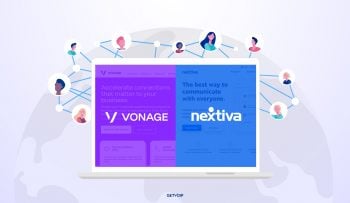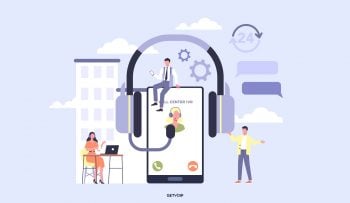Previously an expensive solution requiring complicated hardware, call recording has since trickled down to become a feature offered in most, if not all, Business VoIP solutions. Thanks to the simplicity of a Hosted PBX platform, your business gains access to robust features like call recording without the headache and cost that previous came along with it.
In fact, call recording has become so common, we think it’s a must have feature for just about any business. Of course, call recording has become standard and a must-have for any contact center, but even businesses that focus less on customer contacts can still find a use from recording and keeping a log of all their calls.
To help your business understand if call recording would be a helpful addition to your communications, we wanted to break down a number of use cases and benefits the feature can bring to the table.
Why Call Recording?
When it comes to Contact Centers, your business needs to be as agile as possible to respond to the ever-changing demands of customers. We live in a time where the customer experience is a critical part of any business that interacts with clients — if customers have bad experience, they’ll simply shop elsewhere.
At its simplest level, call recording can offer your business a way to ensure legal regulatory compliance, ensure company wide guideline compliance, and a way to monitor the customer experience as it unfolds in every single phone call your business takes. But beyond fulfilling the needs of a contact center, call recording can also be utilized by any business.
1. Training and Quality Assurance
So, as I already stated, the major use for call recording is within a contact center. Managers can listen in on recorded phone calls to ensure that agents are meeting quality standards to deliver the best customer experience possible.
They can ensure that the interactions your agents are having with customers meets that level of quality and satisfaction your business is striving for. When it comes to training, call recordings allow managers to find specific examples of what to do, and what not to do from factual, real life interactions.
Call recording can also help managers understand which agents might need extra training and guidance, with a glimpse into their performance as it actually occurred.
2. Enhance Your Product or Service
With call recording, your business can look back at previous interactions between agents and customers to form a better understand of how to improve the product or service your business offers.
By listening into support phone calls, product development and marketing teams can gain an insight on exactly what issues customers are having, and what pain points they experience.
This will allow these teams to gain greater insight, and understand how and where the product or service needs to be improved. These recordings again provide real life, factual interactions and highlight the real problems customers are facing.
3. Ensure Regulatory Compliance
Many businesses, particularly those in the medical field, as well as contact centers, have to abide by very specific regulatory compliance laws. For example, in the medical field, your business must follow HIPAA compliance regulations to ensure consumer and patient information is protected.
Call recordings allow managers and administrators to look into the exact interactions your business is having with customers and patients, and ensure that agents are following regulatory compliance laws as they need to be.
Again, this can also help managers determine which agents require training, or when and how to implement new regulations and guidance for agents to ensure compliance.
4. Capture Missed Details and Information
Even with modern CRM solutions that allow your agents to log every single piece of information for every single interaction, its entirely possible that something could fall between the cracks.
Agents still may have to manually input information and write notes on their tickets for each interaction. Human error is real, and its possible that an agent could forget to input the correct information, or maybe even completely forgot something the customer told them.
Call recordings allow your business to go back in time and listen to the interaction as they happened, offering an opportunity to find that missed information. This can help save time, and ensure the up-most accuracy.
5. Resolve Potential Disputes
Call recording can actually be your business’ strongest line of defense when it comes to any potential disputes between customers and clients. The litigation that could arise from a potential dispute could be absolutely crushing to a small business, and a head ache to even larger businesses.
Call recordings can help prevent any disastrous disputes, or prevent disputes from evolving into a lengthy and costly legal battle. Recordings of every single interaction will prevent disputes from turning into he-said/she-said battles, since the interaction and conversation was recorded.
Managers can go back and listen to the interaction to see what happened, and use that information to best resolve the dispute.
6. Build Customer Personas
Similar to the idea of improving your business’ products or services, call recordings can even help your business, specifically a marketing team, better understand who your customers are.
Recordings will allow these marketing teams to listen in on calls and interactions, and build out a persona and demographic profile for different customers.
For example, if one age group is always calling in asking about a similar product or promotion, your business can tailor future services and develop a marketing approach to capture this demographic, or alter the service to fit their needs better. Call recordings offer marketing teams the ability to gain a vast amount of insight from every day conversations and interactions.
Does My Business Need Call Recording?
We certainly think so, and if any of these scenarios sounds appealing, then it sounds like you think so as well. Call recording was previously limited to only the largest enterprise players that could pay for the feature and hardware required to not only record, but also manage and store recordings.
However, cloud services now make this possible for even the smallest businesses — and we think call recording is even more imperative for small and midsize businesses than it might be to a large enterprise. After all, a big enterprise would have the capital and legal teams to fight any potential disputes, meanwhile a dispute could mean a massive headache for a smaller business that isn’t properly prepared to defend themselves.
Any business that is interacting with the public and serving customers should also always be looking for new ways to improve their customer service, and the customer experience. Call recording is also one of, if not the best way to gain a large amount of insight into the customer’s journey, and how agents are preforming.
The edge that this simple feature can provide is just massive when compared to the issues that could occur without it.
How Can I Enable Call Recording?
Well, depending on the solution that your business already has, this process might differ a bit. With using an on-premise solution, or even legacy PTSN services, your business might need to install some costly hardware to not only record calls, but also manage and store all of the recordings.
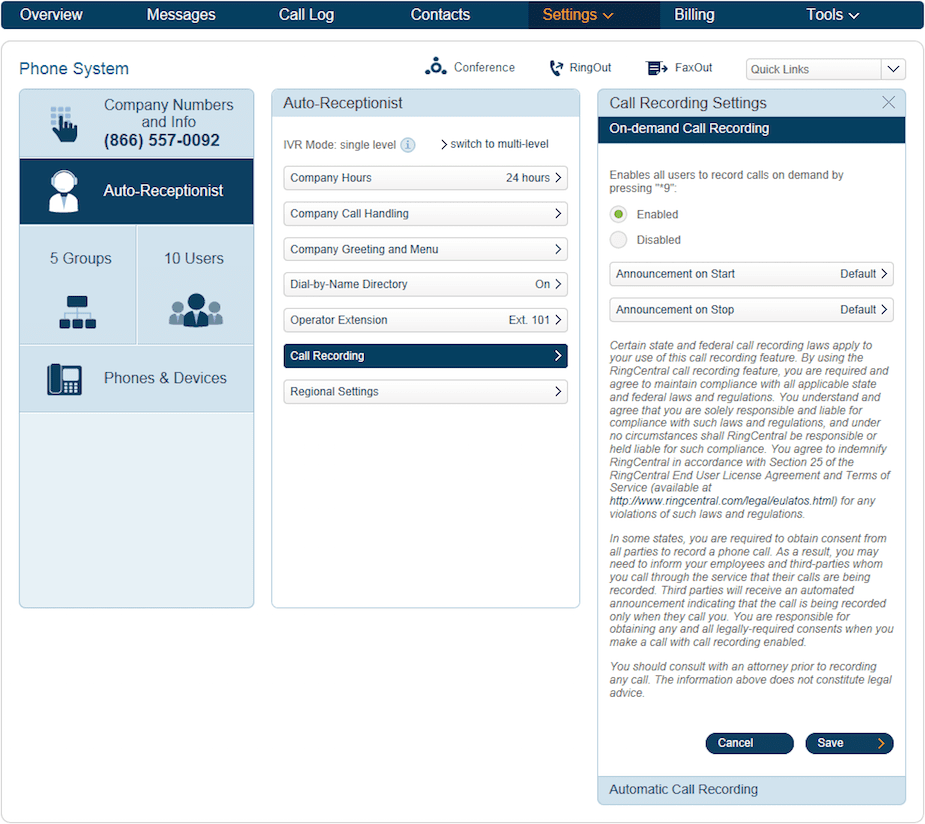
Thankfully, if your business is already using a Hosted PBX solution like say RingCentral or Nextiva, then the feature could possible already be included within your service plan. Popular Call Center solutions like Five9 and their alternatives also include call recording as standard.
With a Hosted solution, enabling call recording would be as simple as enabling any other feature: just log into your provider’s portal page, and there should be an option to turn the feature on, and manage all recordings from right there in the app or portal.
Sometimes this also comes with a bit more options, for example Nextiva’s call recording service allows for multiple recording modes:
- Always: automatically record every single call in its entirety
- Always with Pause/Resume: Automatically record all calls with the ability to pause and restart recording during the call
- On Demand: Only record selected calls
- On Demand with User Initiated Start: Users are given the discretion on when to initiate the call recording
But let’s say your service does not include call recording as a feature, or your business is looking for a simple way to add this feature to an existing on-premise platform? Well, other solutions exist, like one we featured in the past: OrecX. OrecX is a stand-alone open source call recording platform that offers even a bit more than the packaged add-on your phone plan has.
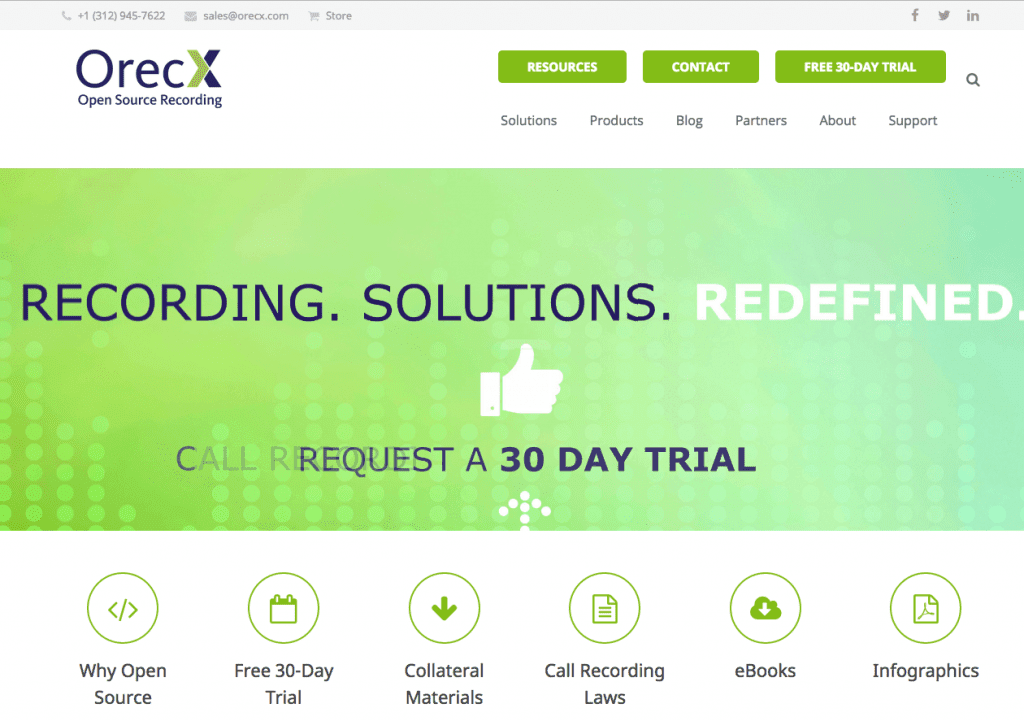
While the feature is no-longer hidden behind expensive paywalls, or limited to the biggest teams due to expensive hardware, there still comes a challenge in call recording: managing and storing all that data.
How to Manage Recorded Calls
Call recordings are simply audio files, and audio files can take up a lot of space: especially if calls go on for a long amount of time. Previously, managing call recordings required stand-alone servers to host and save all of the files, this is why the service was usually only embraced by the largest Enterprise companies who had the capital and IT teams to setup and manage all of this.
But thanks to the advent of Business VoIP and hosted services, any size business can gain access to the tools necessary to manage and store their call recordings. However, depending on the service you have, the process and any associated costs might differ:
- For example, 8×8 which offers call recording with their plans allows up to 1 GB of recorded calls per each extension for free. Anything over that costs you $4.99 per gig.
- For RingCentral, users can save recordings in call logs for up to 90 days, with up to 100,000 recordings per account.
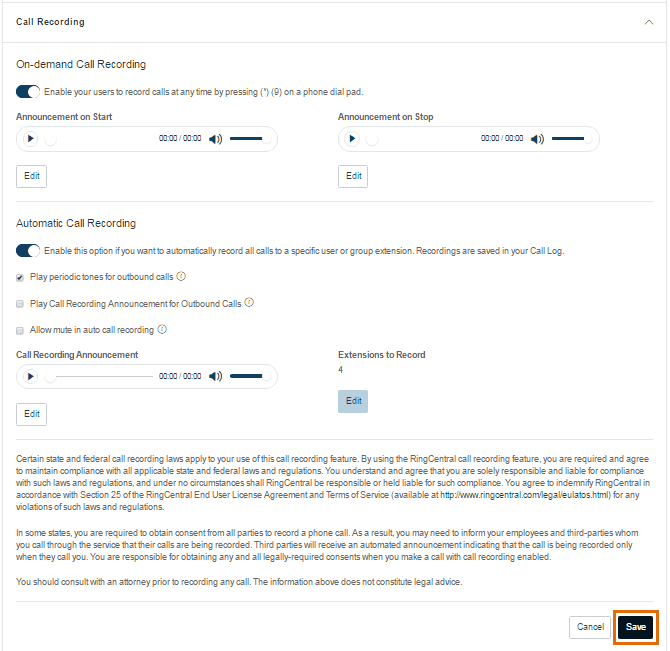
Usually with a hosted solution, calls will be stored by the provider and made accessible to users through their online management portal, or even their dedicated app. From here users will usually have the options to listen to recordings, view any associated information from their CRM app, assign them to specific interactions, download or export recordings, or simply delete recordings.
To stay organized, we have a few recommendations for managing recorded calls:
- Develop a labeling system to ensure no file gets lost. Utilize client information, and interaction dates to differentiate calls
- Always download and store recorded files on a dedicated device, don’t just leave them with provider’s server
- Maintain a backup of recorded calls for at least a year
- Delete or archive older recordings of closed tickets/disputes after a set period of time to stay organized
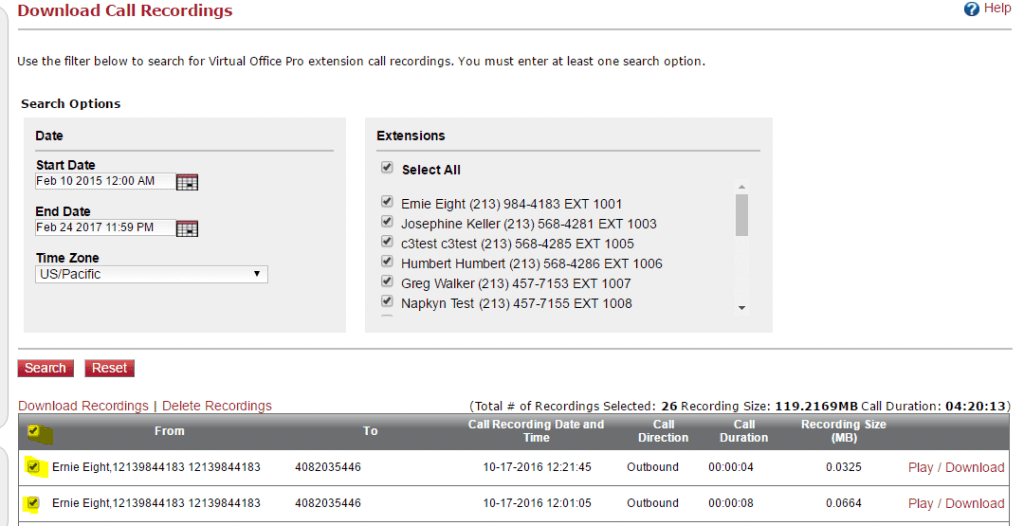
Again, depending on the solution your business is using, this might differ. However, its important to be aware of any associated costs that may occur due to storing call recordings on your provider’s servers.
The Bottom Line
If you ask us, every business that has daily interactions with their customers or clients absolutely needs call recording. This simple tool is no longer expensive and difficult to maintain, but instead has become another standard feature found in most Business VoIP solutions. With the costly storage and hosting of files also handled by providers, call recording has become affordable and simple to manage for even the smallest teams out there.
When you look at the benefits and use-cases that call recording actually brings to the table, it’s easy to understand why contact centers have been relying on recorded calls for so long: the insight and safety net that these recordings can provide truly goes a long way. Whether your business is looking to improve the customer experience, improve agent training, ensure compliance, or even protect against potential legal disputes, call recording is an incredibly valuable tool.






